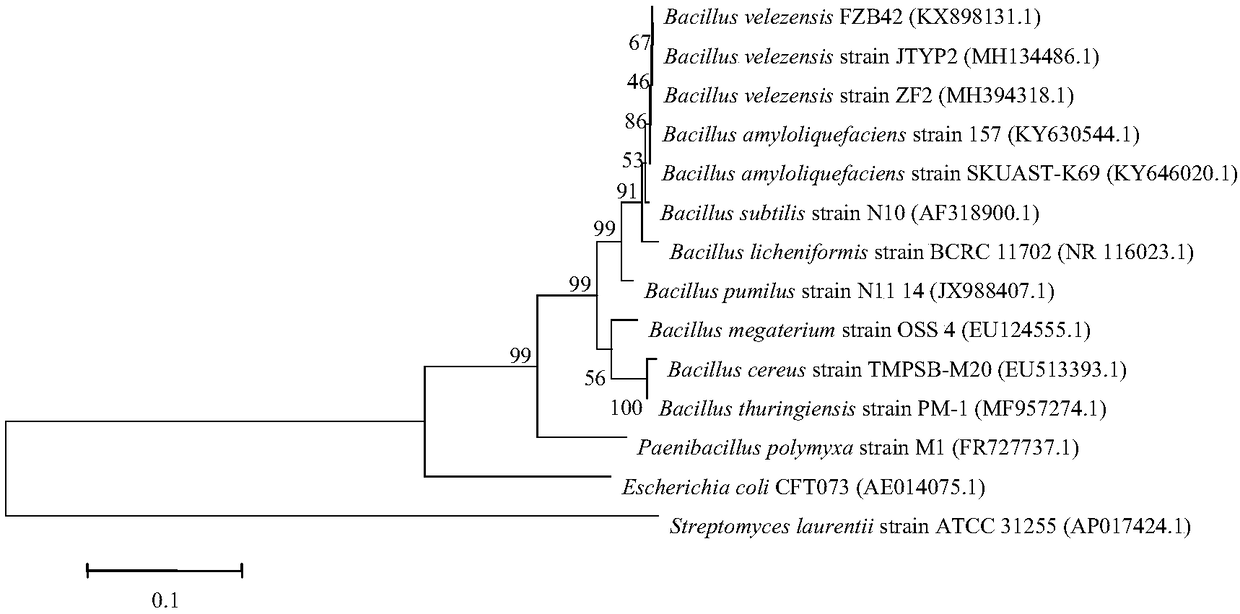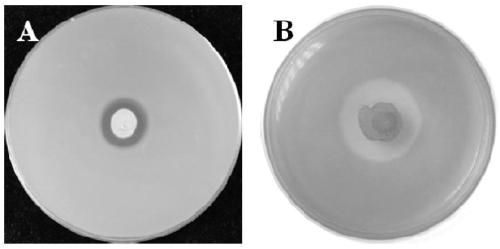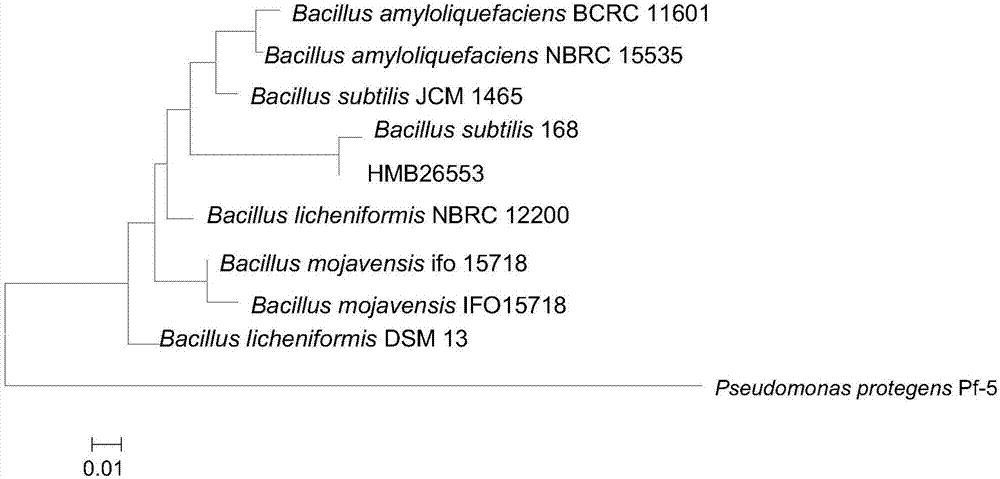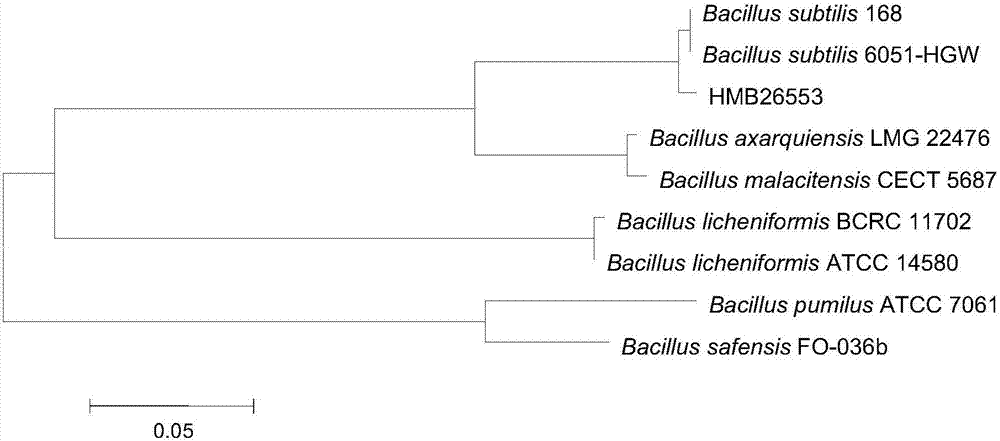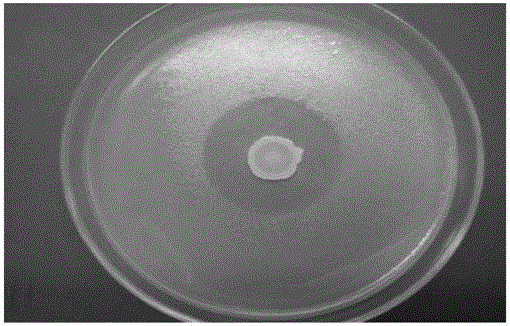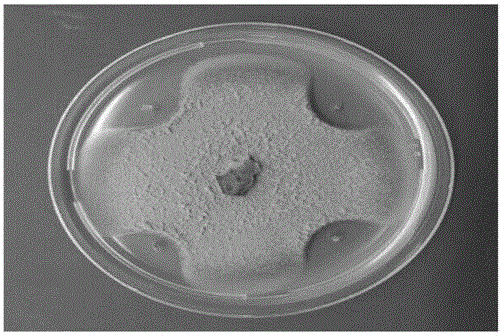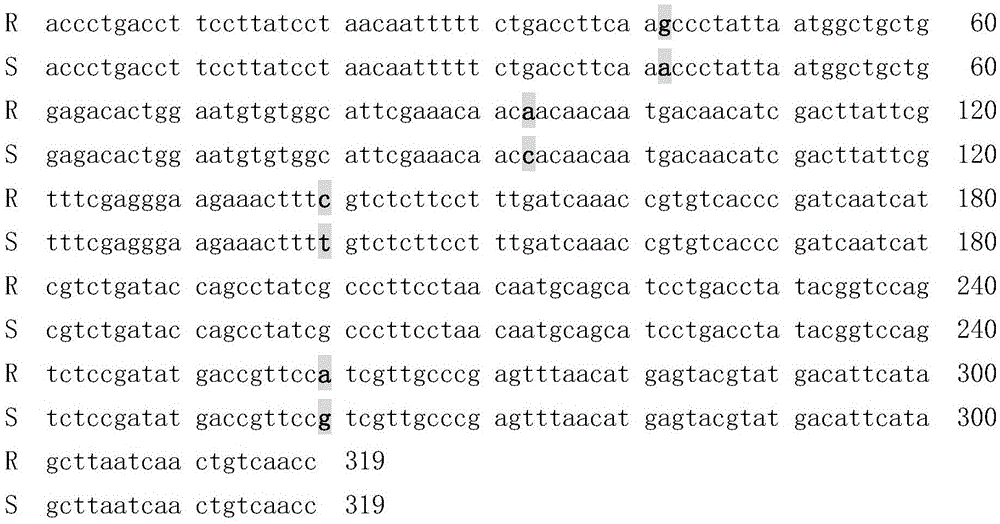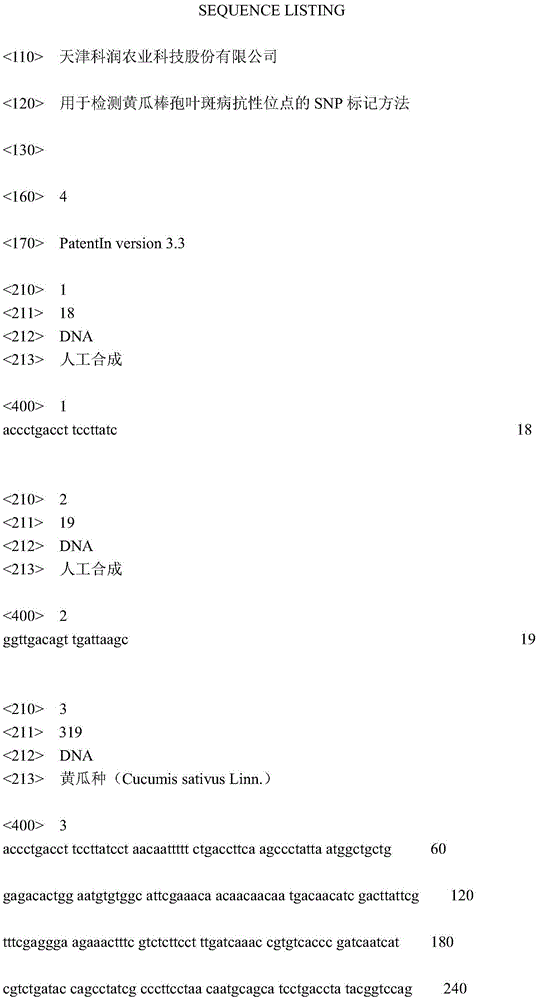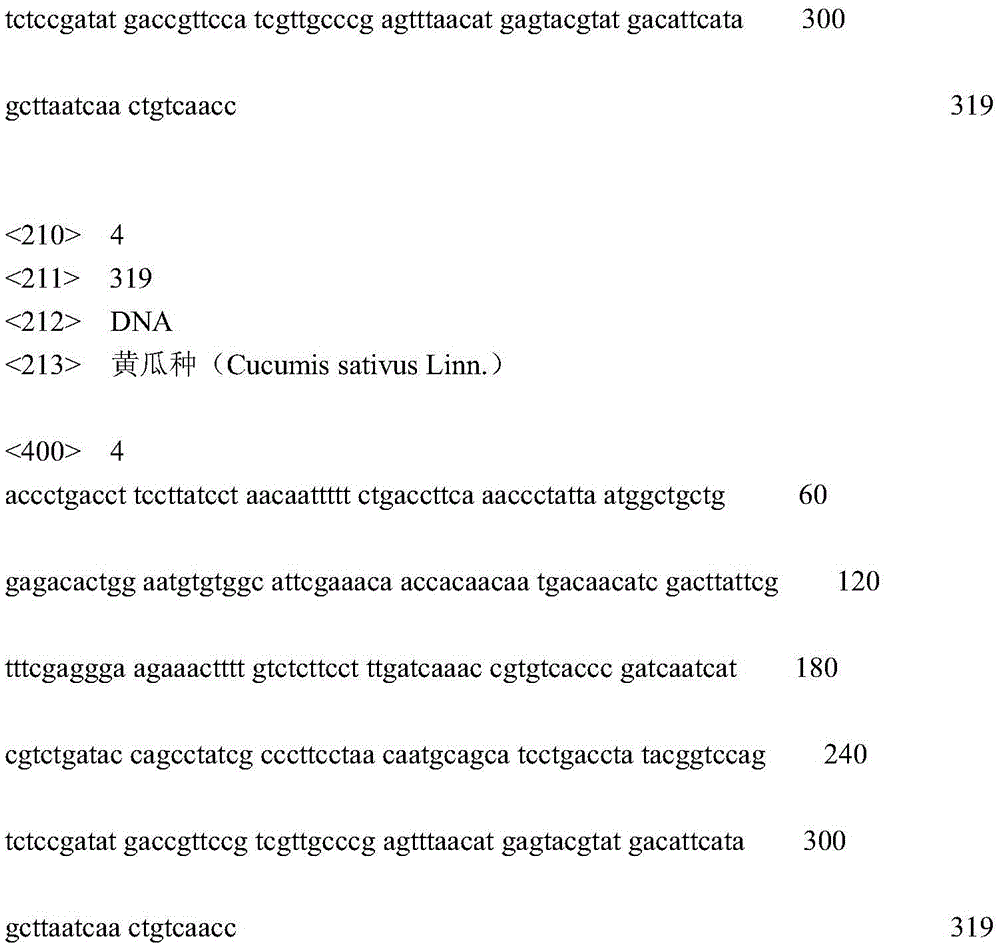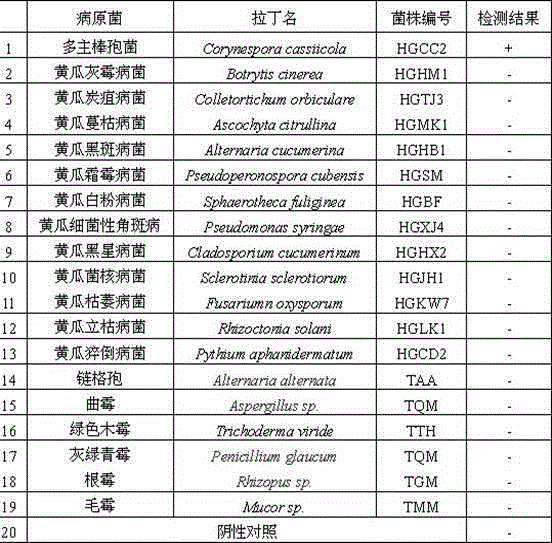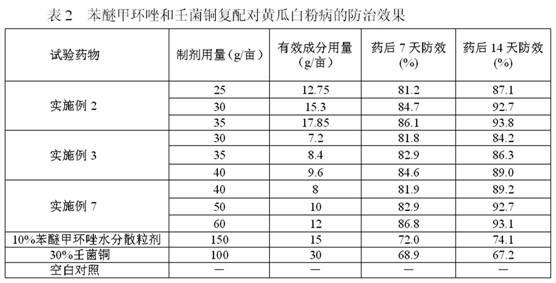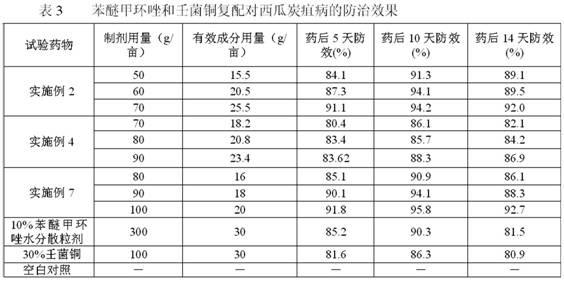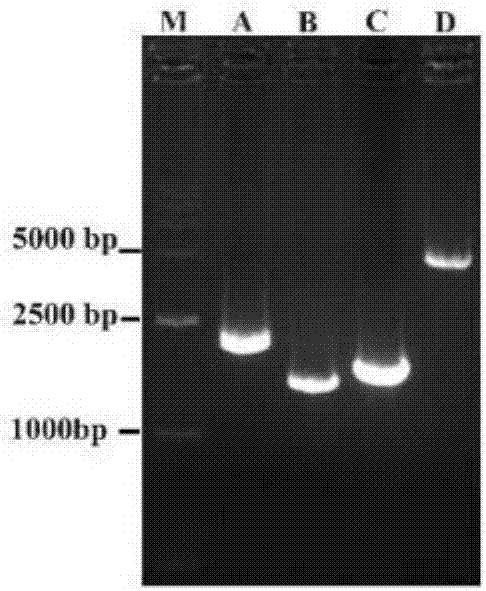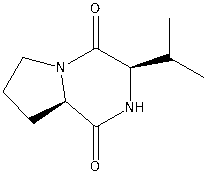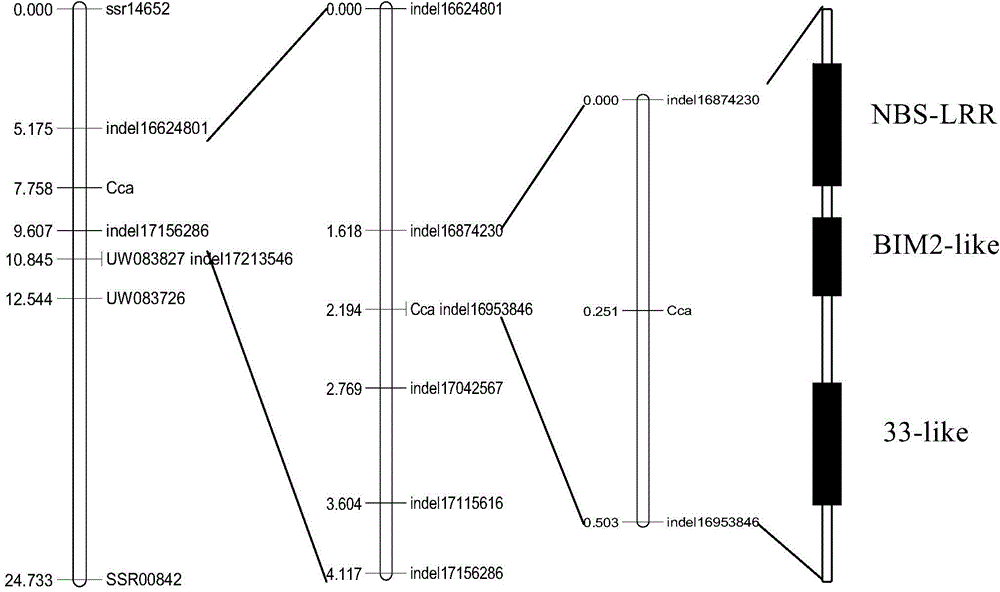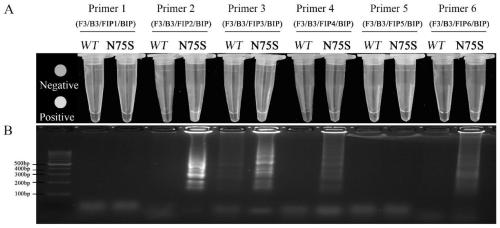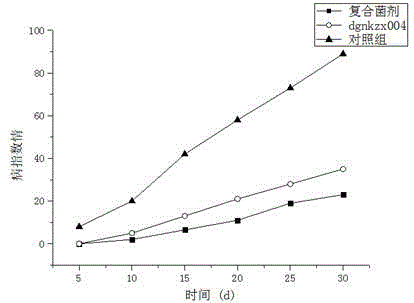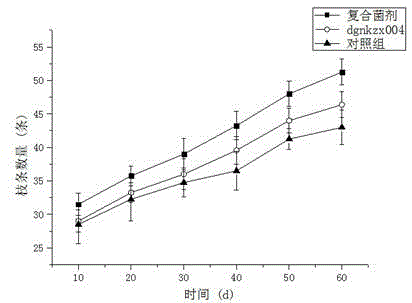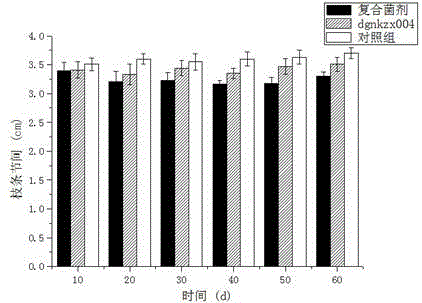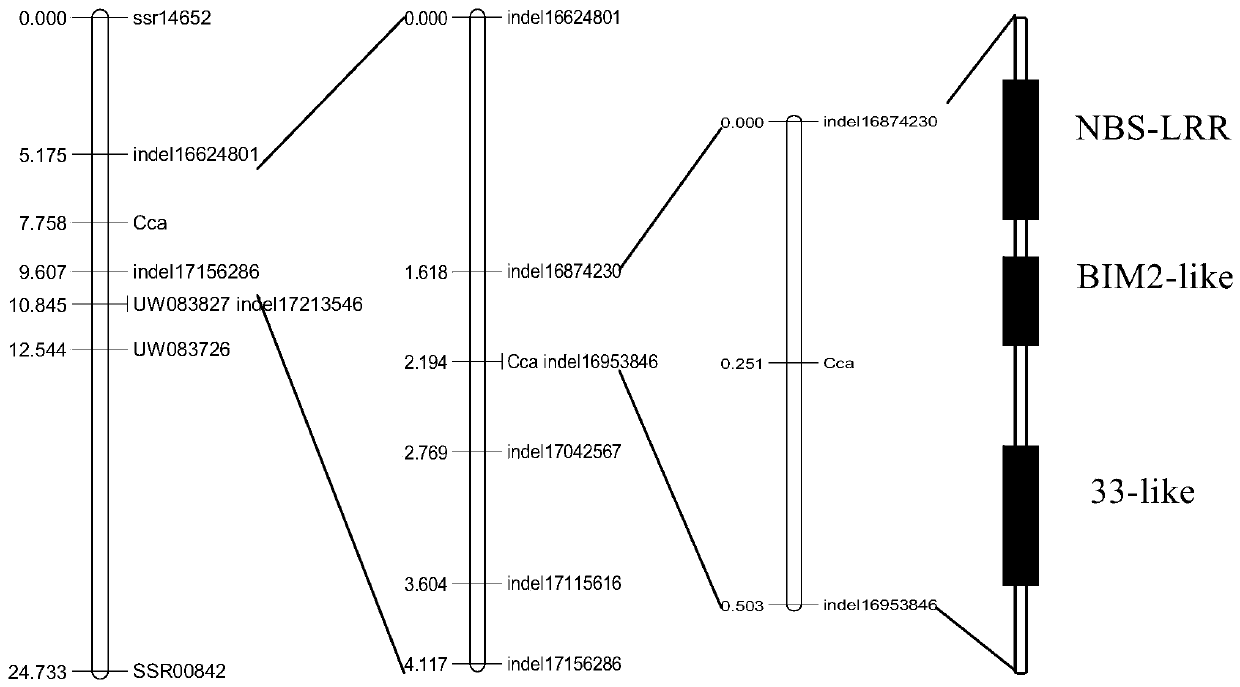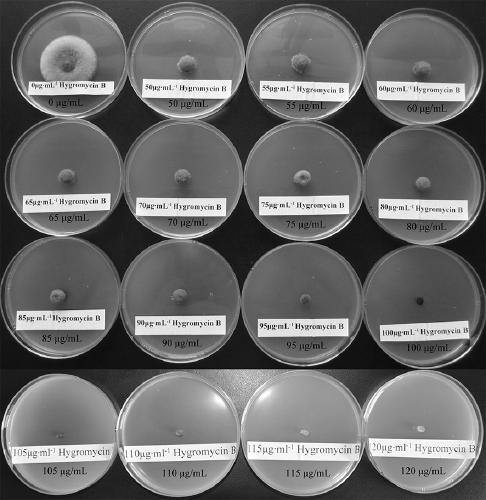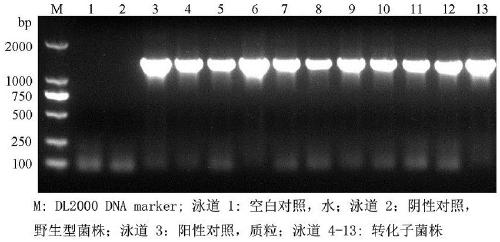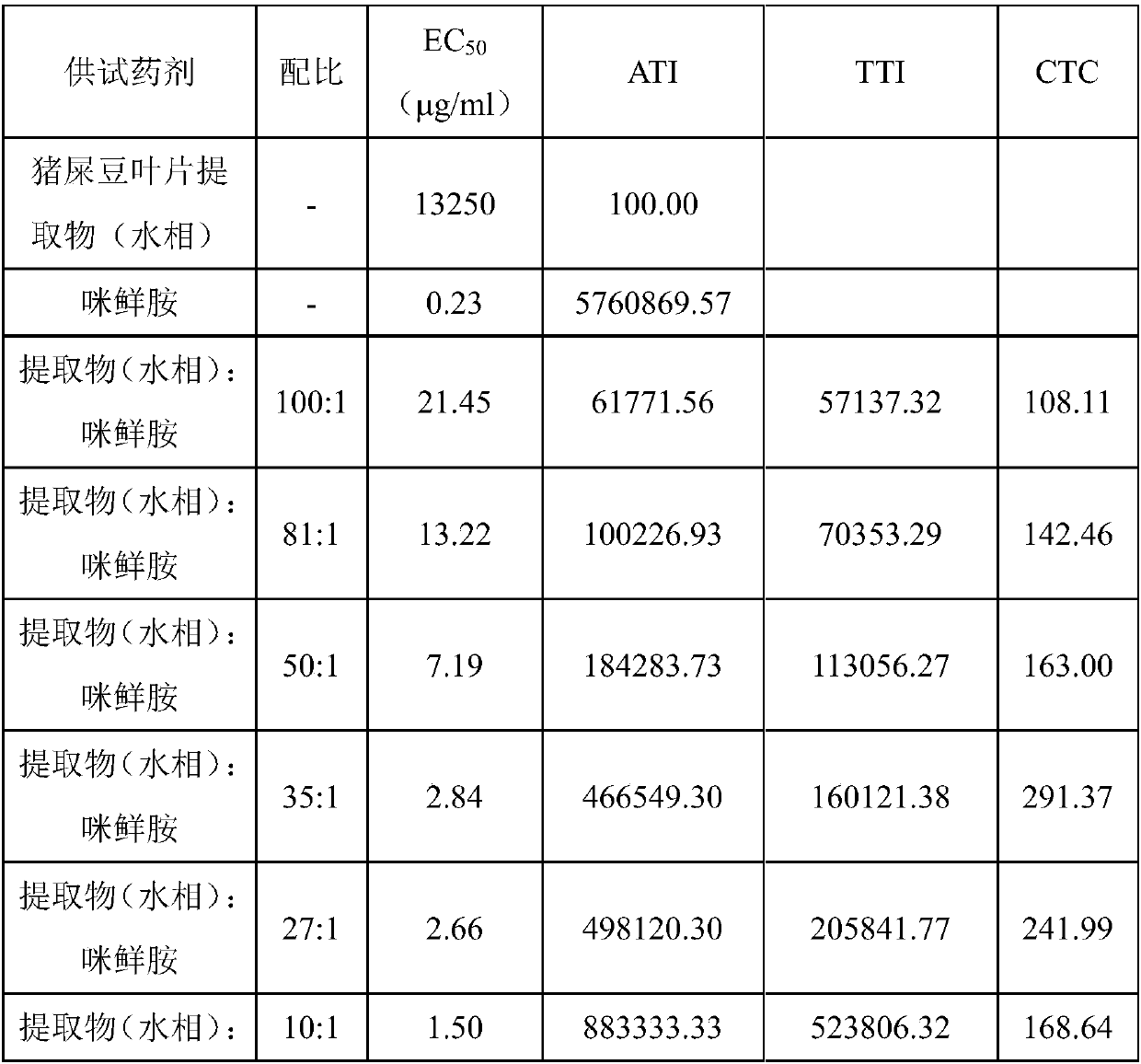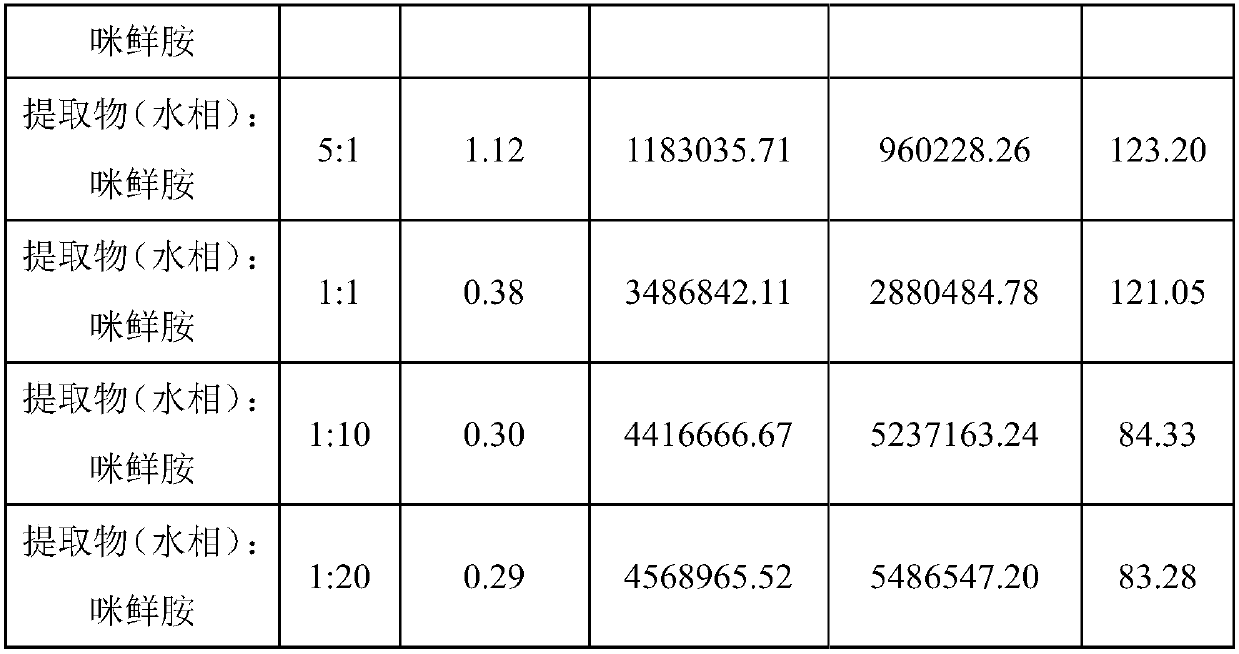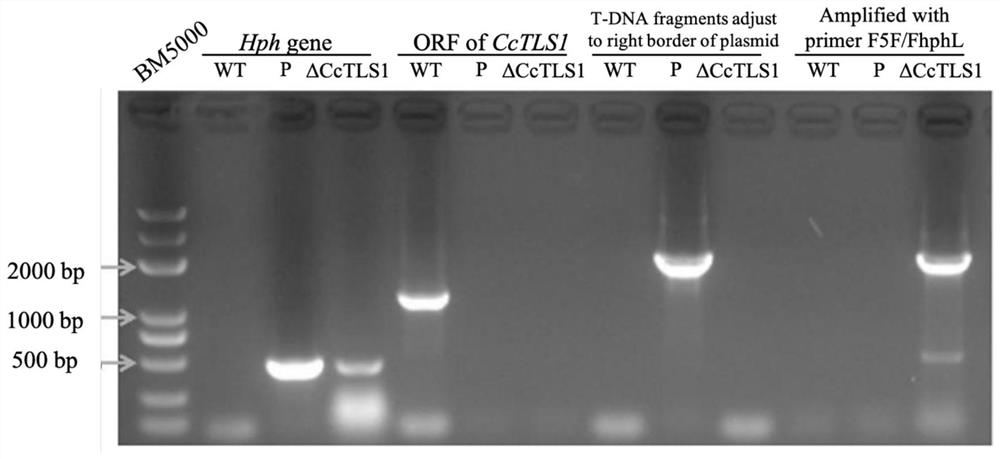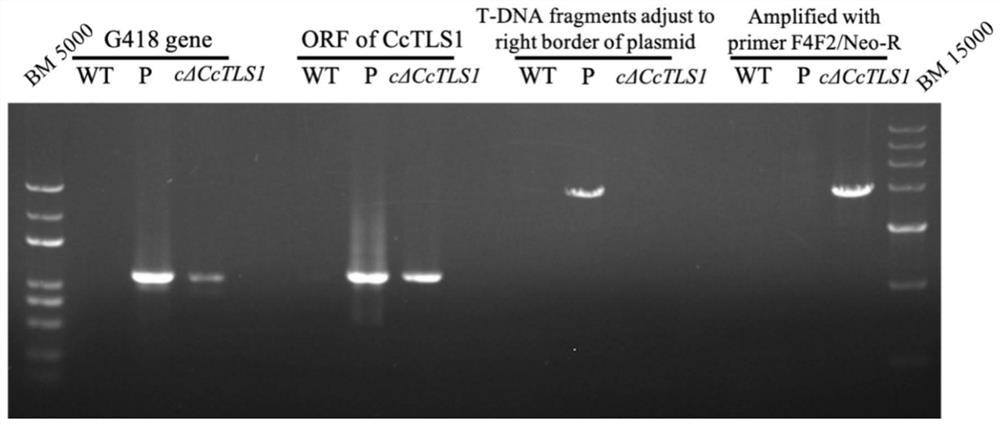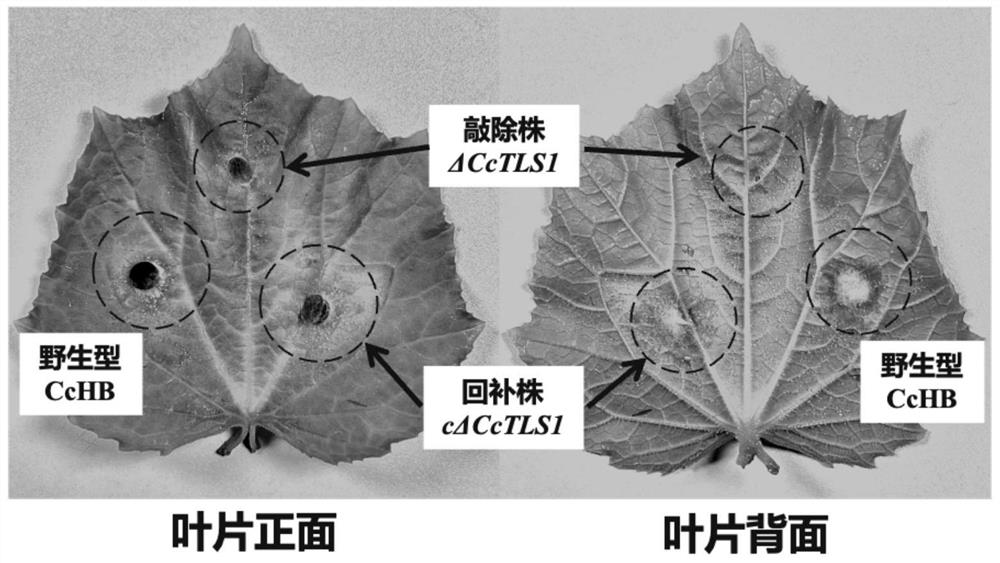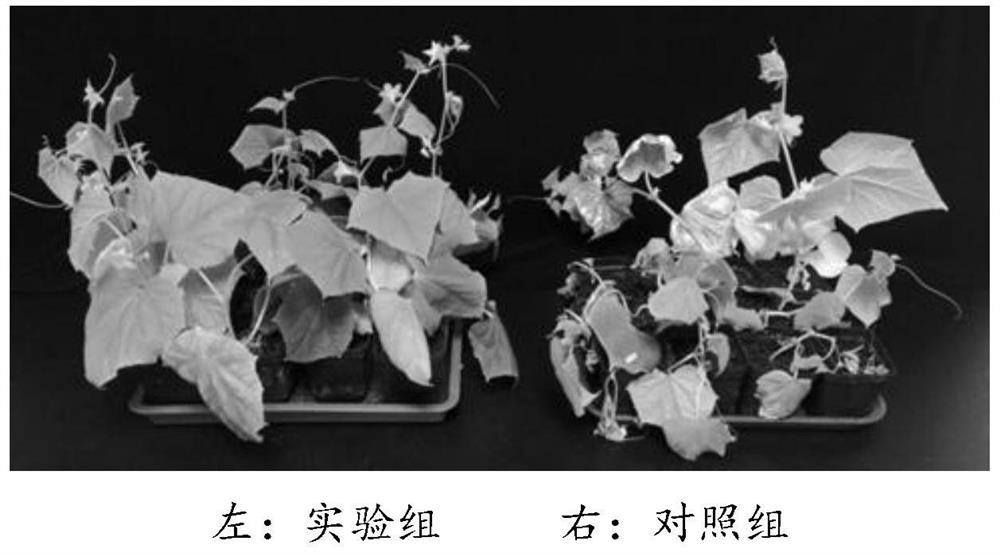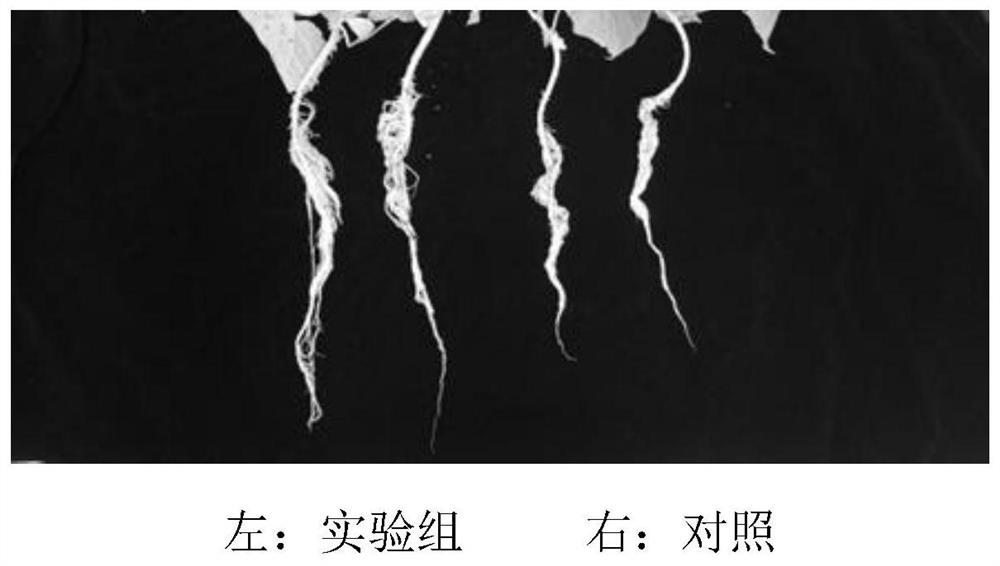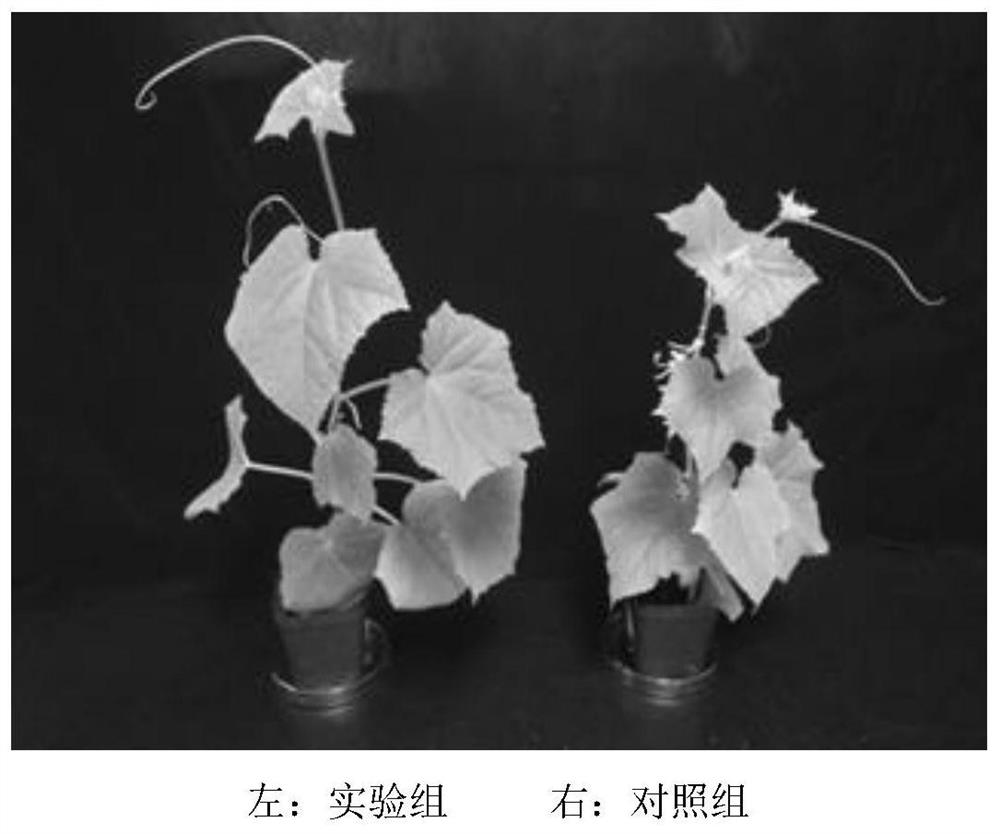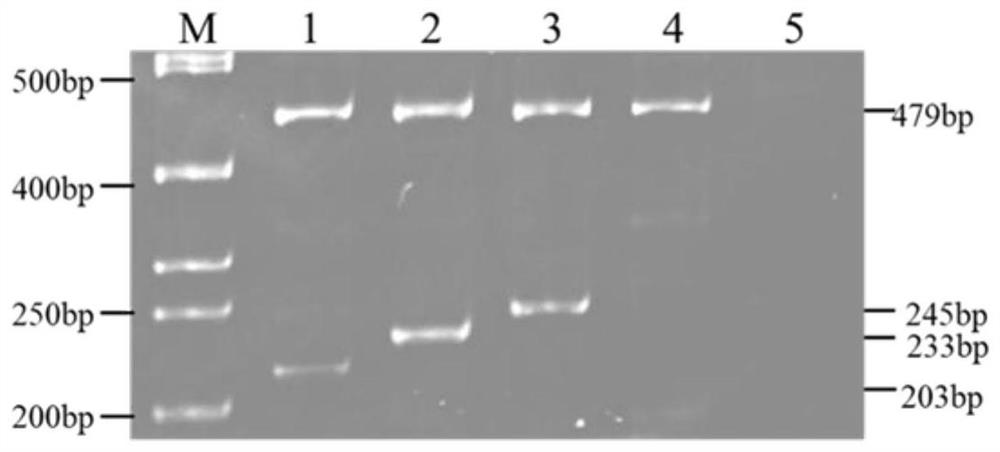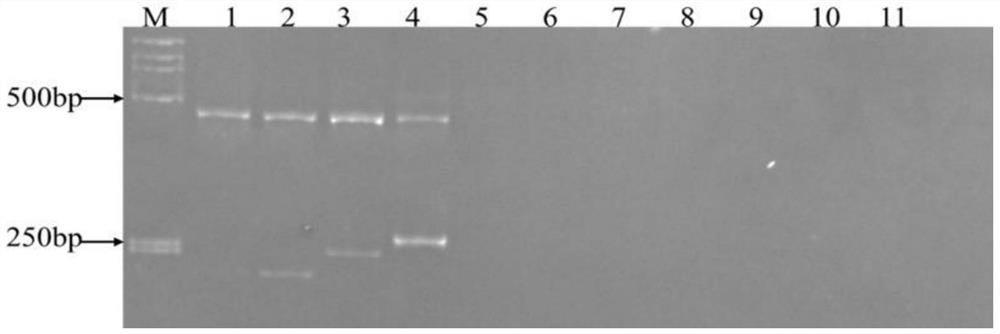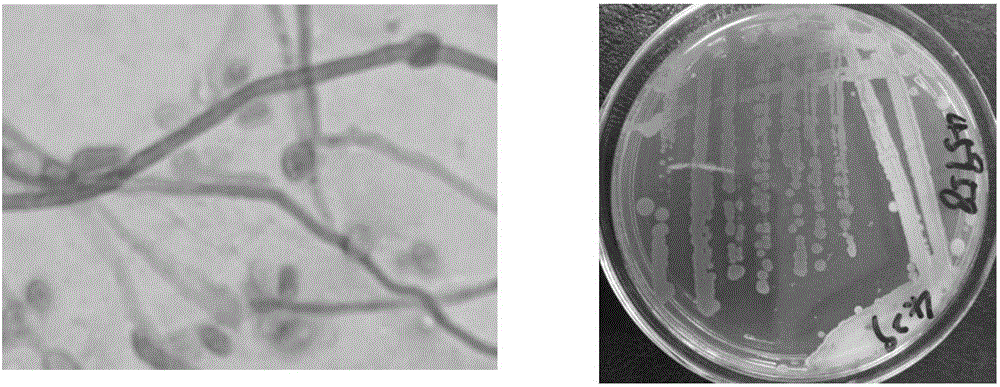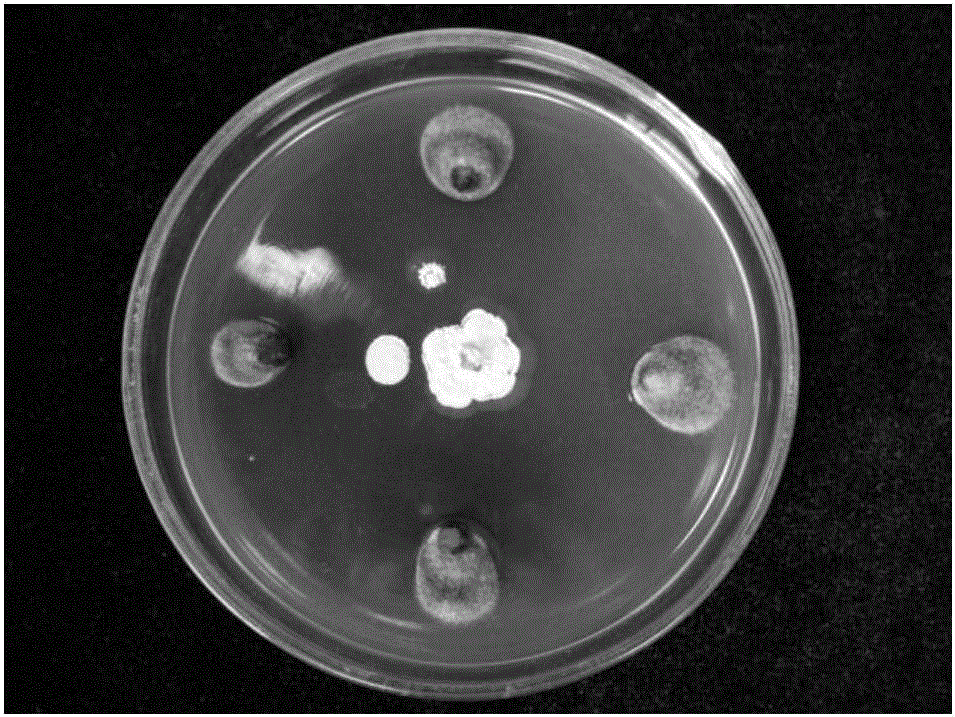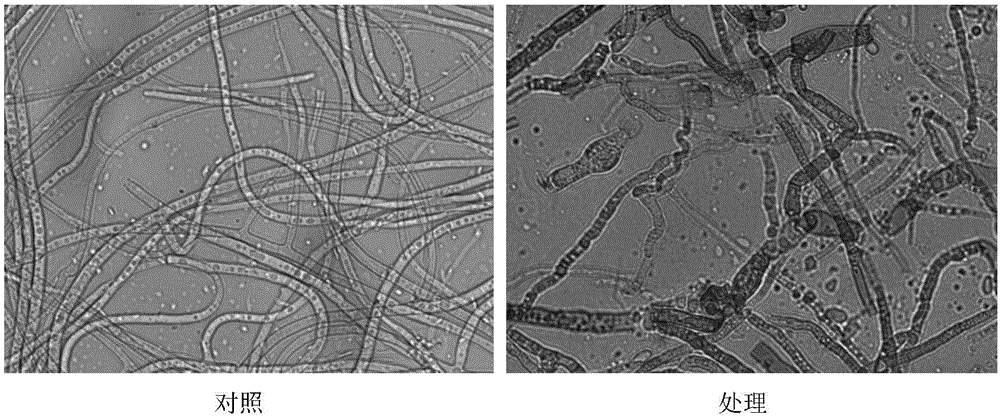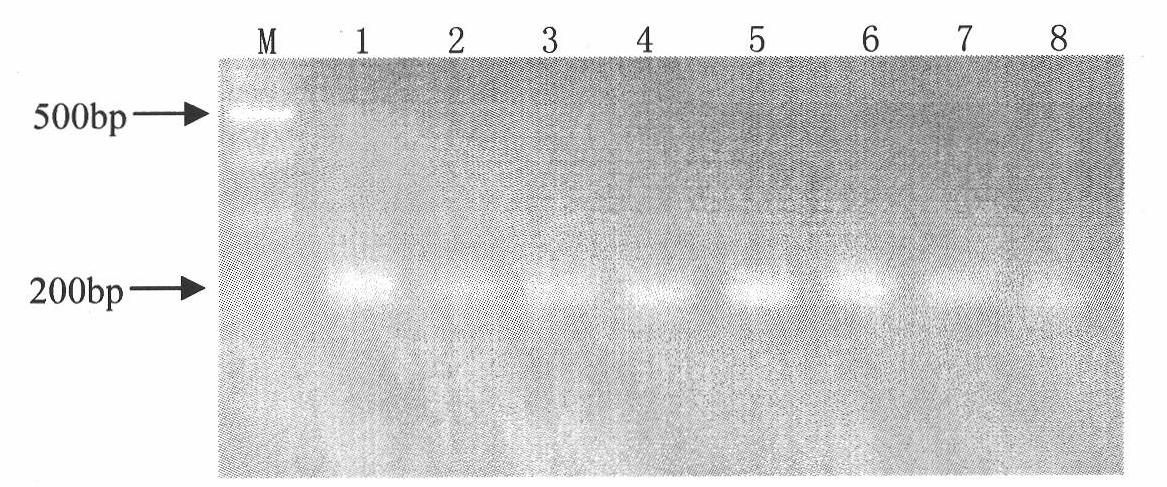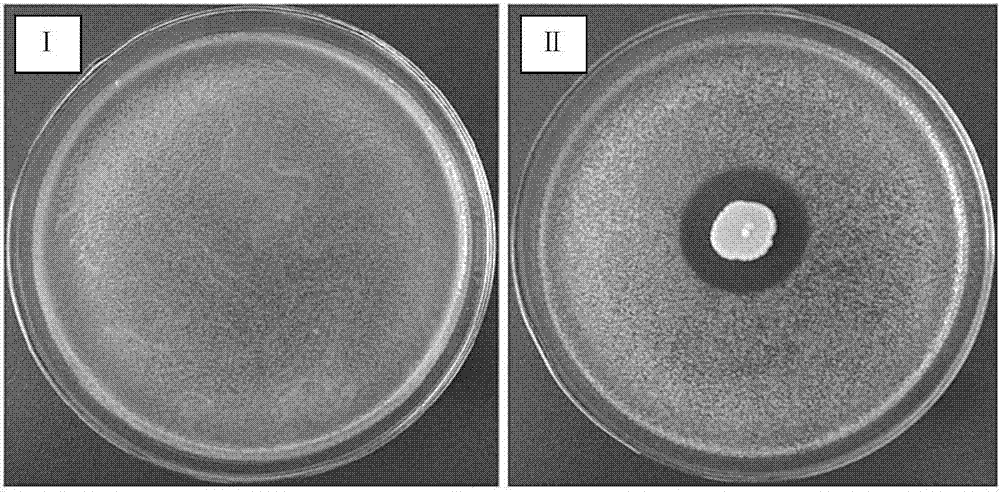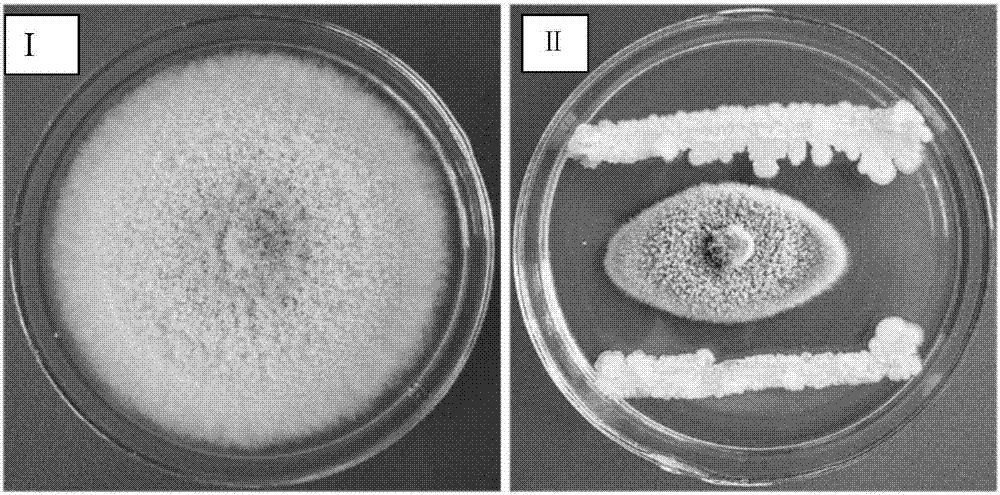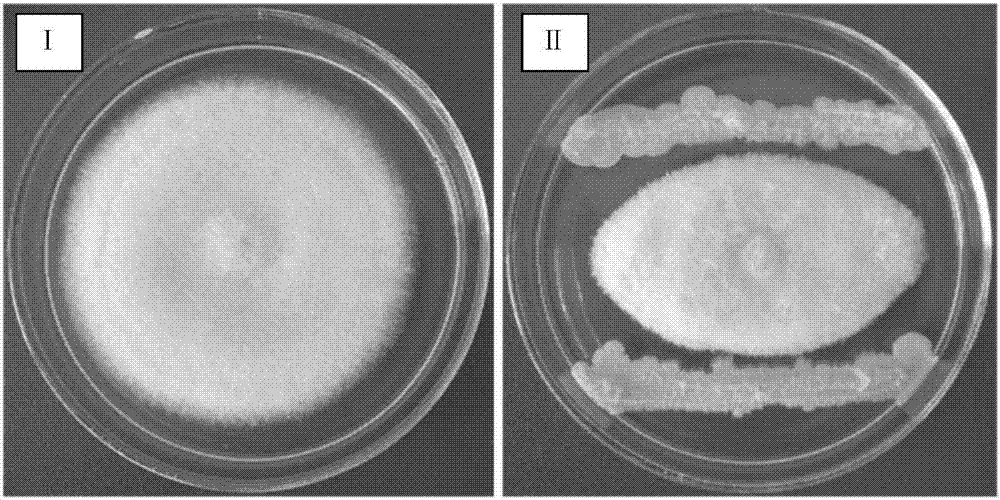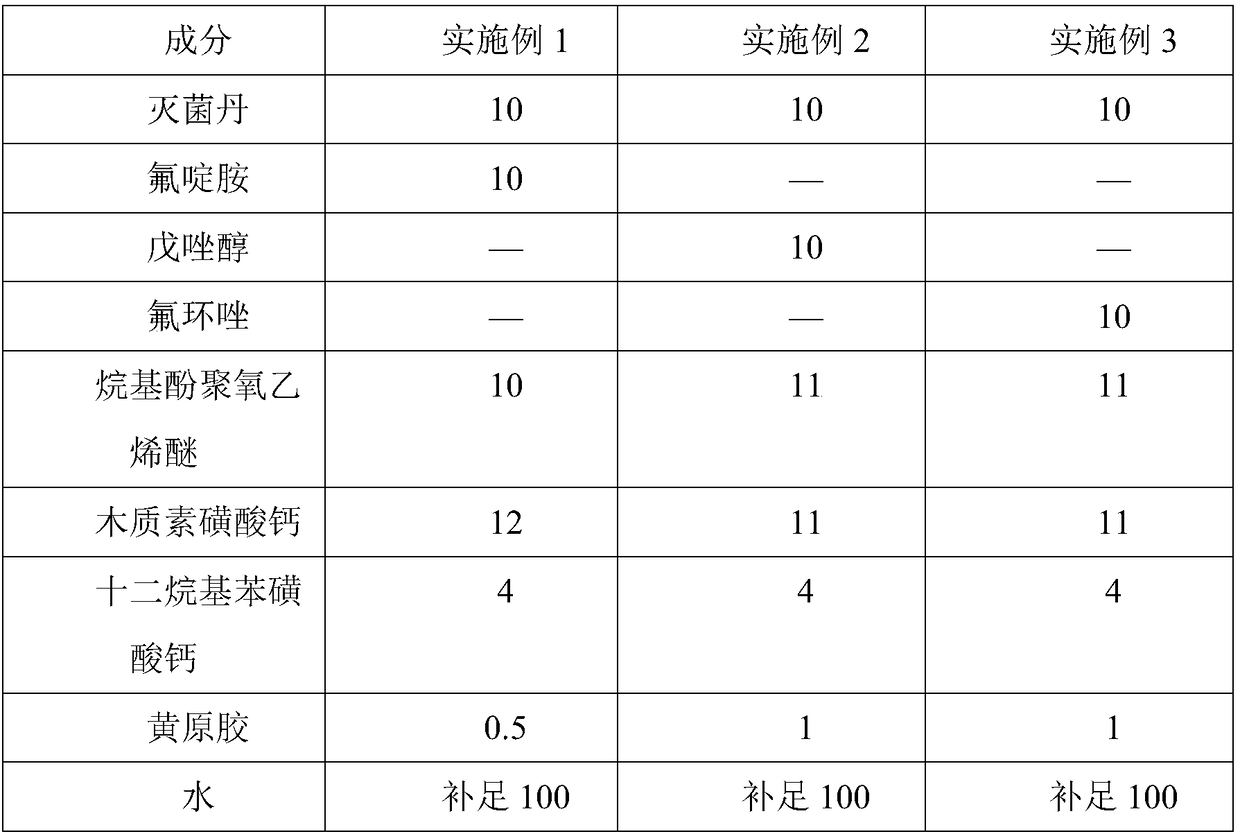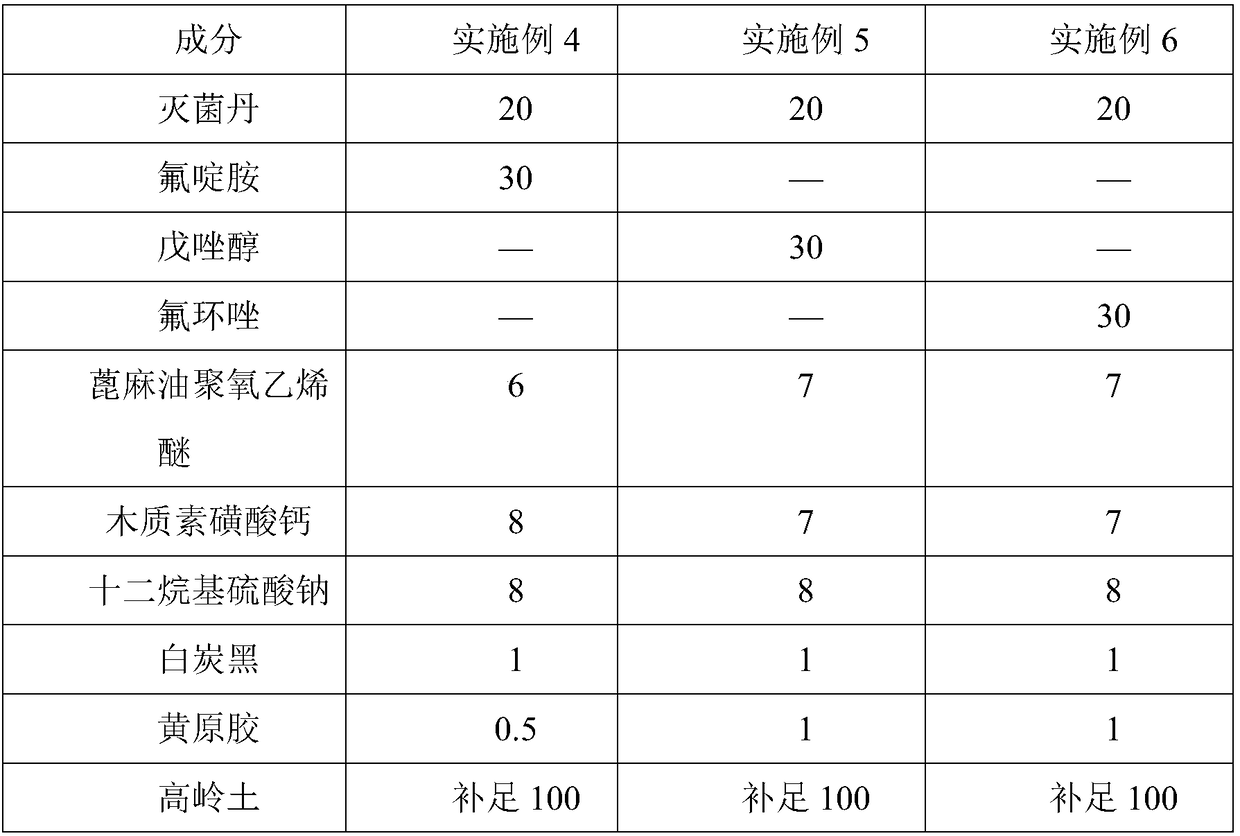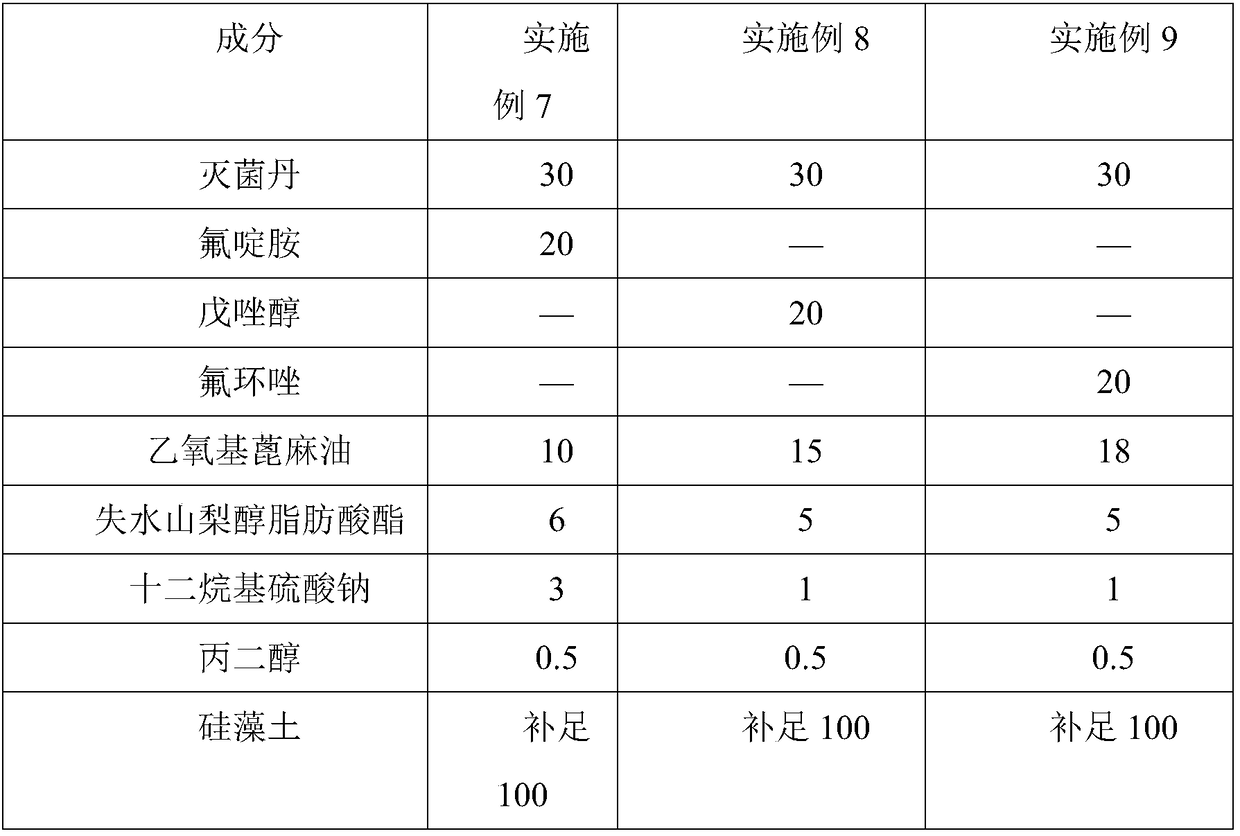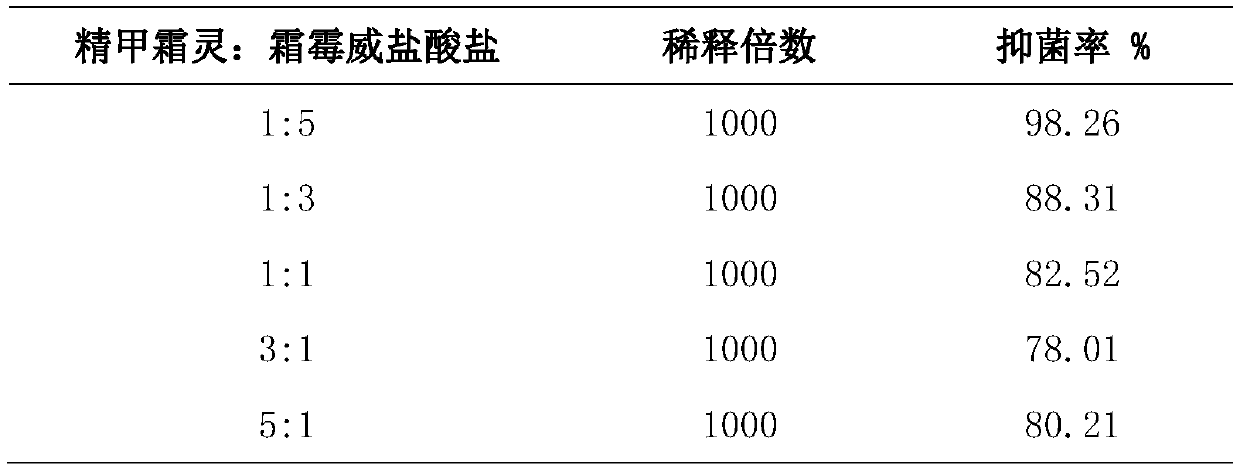Patents
Literature
Hiro is an intelligent assistant for R&D personnel, combined with Patent DNA, to facilitate innovative research.
44 results about "Corynespora cassiicola" patented technology
Efficacy Topic
Property
Owner
Technical Advancement
Application Domain
Technology Topic
Technology Field Word
Patent Country/Region
Patent Type
Patent Status
Application Year
Inventor
Corynespora cassiicola is a species of fungus well known as a plant pathogen. It is a sac fungus in the family Corynesporascaceae. It is the type species of the genus Corynespora.
Bacillus velezensis ZF2 and application thereof to control of plant diseases
The invention discloses bacillus velezensis ZF2 and application thereof to control of plant diseases, and provides the Bacillus velezensis (Bacillus velezensis ) ZF2 with the preservation number of CGMCC NO.16013. The invention further relates to the bacillus, or a culture solution or bacillus suspension thereof or application of fermentation products of the bacillus to restrain bacteria. The bacterial strain ZF2 is simple in culture condition in the fermentation process, and massive active substances are generated, are secreted outside cells, and have remarkable antagonism effects on 6 disease fungi and 7 pathogenic bacteria. During pot culture test in green houses, the prevention effect of the bacterial strain ZF2 on corynespora cassiicola is as high as 92.24%, test proves that the bacillus velezensis ZF2 has good application prospects and also provides a certain theoretical basis and technical support for development and application of microbial inoculum.
Owner:BEIJING UNIV OF CHEM TECH
Bacillus subtilis HMB26553 and application thereof
ActiveCN106939290AGood control effectStrong specializationBiocideBacteriaVerticillium speciesMicrobial agent
The invention discloses Bacillus subtilis strain HMB26553 (Bacillussubtilis), the strain is preserved in China General Microbiological Culture Collection Center, and the preservation number is CGMCCNo.13211. The present invention also discloses a microbial agent produced by use of the strain and application thereof in the prevention and control of plant diseases such as cotton damping-off and the like. The Bacillus subtilis HMB26553 has high control efficiency on the cotton damping-off, the average control efficiency is above 90%; the microbial agent has good effect perdurability, and has no environmental pollution problems; in addition, the HMB26553 has a wide antibacterial spectrum, and has a good inhibitory effect on cotton rhizoctonia solani kuh, cotton verticillium dahlia, cotton Fusarium oxysporum, tomato botrytis cinerea and cucumber Corynespora cassiicola.
Owner:INST OF PLANT PROTECTION HEBEI ACAD OF AGRI & FORESTRY SCI
Bacillus velezensis and application thereof in preventing and treating clubroot of cruciferae
The invention discloses bacillus velezensis ZF481 and application thereof. The strain number of the bacillus velezensis is ZF481, the bacillus velezensis is preserved in the China General Microbiological Culture Collection Center on July 8, 2020, and the registration number of the bacillus velezensis is CGMCC No.20320. The bacillus velezensis ZF481 or / and the metabolite of the bacillus velezensis ZF481 can be used for preventing and / or treating the plant clubroot, or preparing a product for preventing and / or treating the plant clubroot. The strain has an inhibiting effect on the activity and germination of plasmodiophora brassicae resting spores, has a good growth promoting effect on brassicaceous crops such as Chinese cabbage and the like, and also has a good antibacterial effect on phytophthora capsici, stemphylium solani, fusarium oxysporum, alternaria solani, corynespora, Botryis cinerea, rhizoctonia solani and the like.
Owner:INST OF VEGETABLE & FLOWERS CHINESE ACAD OF AGRI SCI
Bacillus amyloliquefaciens for preventing and curing tomato bacterial wilt and application of bacillus amyloliquefaciens
ActiveCN105950506AImprove the effect of prevention and controlBiocideBacteriaMicroorganismBacillus amyloliquefaciens
The invention relates to bacillus amyloliquefaciens W118. The bacillus amyloliquefaciens W118 is collected in China General Microbiological Culture Collection Center (CGMCC) on March 10, 2016, and the collection number is CGMCC No.12200. The invention further provides application of the bacillus amyloliquefaciens W118 in prevention and cure of pathogenic bacteria of tomato bacterial wilt, cotton verticillium wilt, tomato early blight and cucumber corynespora cassiicola. Compared with the prior art, the bacillus amyloliquefaciens W118 and the application thereof have the advantages that the bacillus amyloliquefaciens W118 has a certain prevention and cure effect on the tomato bacterial wilt, and the highest prevention and cure rate can reach 59.2%; the highest prevention and cure rates for the cotton verticillium wilt, the tomato early blight and the cucumber corynespora cassiicola can reach 47.8%, 43.4% and 38.3% respectively.
Owner:NINGBO ACAD OF AGRI SCI
Bactericide composition for control of corynespora cassiicola of crops
ActiveCN103371163ADelay and stop the development of drug resistanceBiocideFungicidesSuspending AgentsHexaconazole
The invention relates to a bactericide composition for control of corynespora cassiicola, with synergism, of crops. The composition is composed of two or three active substances, wherein A component is diethofencarb, and B and C components are any one of azoxystrobin, pyrimethanil, prochloraz, hexaconazole, cyprodinil, fluazinam, boscalid, fludioxonil, mancozeb and chlorothalonil. In a binary composition AB, the weight ratio of diethofencarb to another bactericide is 99-1:1-99. In a ternary composition ABC, the weight ratio of A, B and C is 1-50:1-50:1-50. The other components are auxiliary components which are allowed to be used and acceptable in pesticides. The bactericide composition can be prepared into wettable powder, missible oil, suspending agents, water dispersible granules, emulsion in water and microemulsion. The bactericide composition has obvious synergism, has multiple action mechanisms and acting sites and can delay the occurrence of resistance to drugs of pathogens.
Owner:INST OF VEGETABLE & FLOWERS CHINESE ACAD OF AGRI SCI
SNP (single-nucleotide polymorphism) marker method for detecting cucumber Corynespora-cassiicola-resistant site
InactiveCN105603119ASimple methodReliable resultsMicrobiological testing/measurementDNA/RNA fragmentationDiseaseNucleotide
The invention discloses an SNP (single-nucleotide polymorphism) marker method for detecting a cucumber Corynespora-cassiicola-resistant site. The method comprises the following steps: (1) extracting genome DNA (deoxyribonucleic acid) of a detected sample cucumber; (2) by using the DNA as a template and sequences disclosed as SEQ ID No.1 and SEQ ID No.2 as forward and reverse primers, carrying out PCR (polymerase chain reaction) amplification to obtain a 319bp nucleotide sequence; and (3) carrying out sequencing on the nucleotide sequence: if the nucleotide sequence is disclosed as SEQ ID No.3, the sample is disease-resistant, and if the nucleotide sequence is disclosed as SEQ ID No.4 or simultaneously has the sequences disclosed as SEQ ID No.3 and SEQ ID No.4, the sample is disease-infected. The method is simple, and has the advantages of high efficiency and reliable result. The molecular marker can be used for molecule-assisted selective breeding of cucumber Corynespora cassiicola resistance, and can lay a foundation for improving the disease resistance of the cucumber varieties and completing the cucumber molecular breeding technique platform by gene engineering.
Owner:TIANJIN RES INST OF VEGETABLE
LAMP primer group and detection method for rapidly detecting corynespora cassiicola
InactiveCN104962639ALow costEasy to operateMicrobiological testing/measurementMicroorganism based processesLoop-mediated isothermal amplificationBiology
The invention discloses an LAMP primer group and a detection method for rapidly detecting corynespora cassiicola. A set of specific detection primer group is designed and selected for specific toxin cassiicolin gene sequence of cucumber corynespora cassiicola. The primer group consists of four specific primers, i.e. CC-FIP, CC-BIP, CC-F3 and CC-B3. The invention relates to a loop-mediated isothermal amplification (LAMP) detection method containing the primer group. The detection result can be directly observed by virtue of eyes or the color variation of SYBR GreenI is used as a judging standard to determine whether the corynespora cassiicola exists in a to-be-detected sample. The selected primer is high in sensitivity and specificity. The established detection method has advantages of good accuracy, short detection time and simple instrument and device; the process from the sample treatment to the report result can be completed only in 1.5h, a PCR instrument and an electrophoresis apparatus are not needed, the operation is simple, and compared with other PCR methods, the specificity is higher.
Owner:텐진인스티튜트오브플랜트프로텍션
Method for fast identifying drug resistance of corynespora cassiicola on fluopyram and special primer pair
ActiveCN107299147ATimely adjustment of prevention and control strategiesResistance delay and controlMicrobiological testing/measurementFluopyramDrug resistance
The invention discloses a method for fast identifying drug resistance of corynespora cassiicola on fluopyram and a special primer pair. The invention provides application of a substance for detecting succinic dehydrogenase B subunit coding gene A1020G site basic group in the corynespora cassiicola genome to the detection of the resistance of the corynespora cassiicola resistance; the A1020G site is the 1020-th site in the succinic dehydrogenase B subunit coding gene; the basic group of the A1020G site is A or G. The method for detecting the point mutation of the drug resistance of the corynespora cassiicola on fluopyram provided by the invention has the advantages that the method can be used for fast and sensitively detecting the resistance occurring and development dynamic state of the field corynespora cassiicola on fluopyram so that the prevention and control strategy on the cucumber target leaf spot diseases can be timely regulated; the further development of the drug resistance can be delayed and controlled.
Owner:INST OF VEGETABLE & FLOWERS CHINESE ACAD OF AGRI SCI
Bactericide composition, bactericide pesticide and application of bactericide composition and bactericide pesticide
ActiveCN102669112AImprove the effect of prevention and controlReduce the cost of prevention and treatmentBiocideFungicidesMicroorganismInsecticide resistance
Disclosed are a bactericide composition, a bactericide pesticide and an application of the bactericide composition and the bactericide pesticide. The bactericide composition is composed of difenoconazole and cuppric nonyl phenolsulfonate, and the weight ratio between the difenoconazole and the cuppric nonyl phenolsulfonate is in the range of (1:50)-(50:1), preferably (1:25)-(25:1). The composition is combined with a helper component which is receptive in the pesticide to compose the bactericide pesticide; and the bactericide pesticide has obvious synergism effects on preventing diseases of watermelon anthracnose, tomato early blight, celery leaf spot or Corynespora cassiicola of cucumbers, the application amount of the single bactericide composition or the single helper component can be reduced, the lasting time of the bactericide pesticide can be prolonged, the generation of insecticide resistance of microbe diseases can be postponed, and the popularization values of the bactericide pesticide are obvious.
Owner:LIER CHEM CO LTD
Allele of succinate dehydrogenase B subunit gene sdHB of Corynespora cassiicola and use thereof
ActiveCN107384884AHigh amide resistanceHigh fluopyram resistanceOxidoreductasesFermentationHigh resistanceSuccinate dehydrogenase
The invention discloses an allele of a succinate dehydrogenase B subunit gene sdHB of Corynespora cassiicola and a use thereof. The invention provides a protein. The protein is obtained through mutation of a succinate dehydrogenase B subunit amino acid I at 280th site in the amino acid sequence into V, wherein other amino acid residues are not changed. Novel unreported allele mutation is found in the Corynespora cassiicola group collected in the Liaoning province and can cause high resistance of the strain to fluopyram. The mutation has the important guiding significance for detection of SDHIs resistance in the field and the later drug resistance management.
Owner:INST OF VEGETABLE & FLOWERS CHINESE ACAD OF AGRI SCI
Cyclic dipeptide and application of cyclic dipeptide in preparation of bactericide
ActiveCN108586462ALess likely to cause harmEasy to degradeBiocideOrganic chemistryDipeptidePyricularia grisea
The invention discloses cyclic dipeptide and application of the cyclic dipeptide in the preparation of a bactericide and belongs to the field of plant protection. The cyclic dipeptide is 3-isopropyl-pyrrolopiperazine-2,5-dione. Pathogen controlled by the bactericide is one or more than one of a group consisting of Botrytis cinerea, corynespora cassiicola, Ascochyta citrullina, Colletotrichum orbiculare, Pyricularia grisea, Candida albicans, Pellicularia, Fusarium oxysporum, Rhizoctonia solani, xanthomonas oryzae, aspergillus flavus and Fusarium moniliforme. The invention reports bactericidal activity of cyclo(L-proline-L-valine) for the first time and provides a new thinking for research and development of the bactericide. As a bactericide, the cyclic dipeptide cyclo(L-proline-L-valine) isderived from a secondary metabolite of Pseudomonas syringae, belongs to a natural product, is easy to degrade in the environment, and is not easy to cause harm o the environment.
Owner:INST OF PLANT PROTECTION CHINESE ACAD OF AGRI SCI
Method for inducing rubber tree corynespora cassiicola fungi to produce spores
InactiveCN105586305AAvoid mutationEasy to operateMicroorganism based processesSpore processesSporeMaterial resources
The invention relates to a method for inducing rubber tree corynespora cassiicola fungi to produce spores, and belongs to the technical field of bioscience. The method includes the steps of preparing inoculation rubber seedlings, culturing corynespora cassiicola fungi, inoculating corynespora cassiicola fungi and inducing corynespora cassiicola fungi to produce spores. The method has the advantages that corynespora cassiicola fungi are kept growing in original hosts, the growth and spore production environment of corynespora cassiicola fungi is similar to a wild environment, the form of produced spores is consistent with the form of spores formed under wild conditions, and it is avoided that spores of corynespora cassiicola fungi are varied by existing indoor artificial matrix culture; inoculation environment conditions can be manually regulated and controlled without being limited by seasons, operation is convenient, and manpower, material resources and time are saved.
Owner:YUNNAN INST OF TROPICAL CROPS
Corynespora cassiicola anti-disease gene Cca as well as encoding protein and application thereof
ActiveCN104928299AVerification functionImprove breeding efficiencyMicrobiological testing/measurementPlant peptidesAgricultural scienceNucleotide
The invention discloses a corynespora cassiicola anti-disease gene Cca as well as an encoding protein and an application thereof. The gene is a nucleotide sequence shown as SEQ ID NO.1 in a sequence list or a nucleotide sequence with 90% or more homology with the sequence shown in SEQ ID NO.1 and with a function identical to that of the sequence shown in SEQ ID NO.1 in the sequence list. The anti-disease gene Cca has an important application value and can be used for assisting the breeding of corynespora cassiicaloa anti-disease species; in addition, a specific molecular marker generated according to the gene sequence information or a tightly linked marker can be used for identifying the gene type of a cucumber and progeny plants, which can be used for the molecular marker to assist the selection and seed breeding, so that the seed breeding efficiency can be improved.
Owner:BEIJING ACADEMY OF AGRICULTURE & FORESTRY SCIENCES
Corynespora cassiicola succinodehydrogenase subunit c N75S resistance mutation detection primer and detection method
InactiveCN110184382AEfficient amplificationStrong specificityMicrobiological testing/measurementMicroorganism based processesNucleotideFluorescence
The invention discloses a corynespora cassiicola succinodehydrogenase subunit c N75S resistance mutation detection primer and a detection method and belongs to the technical field of resistance mutation detection. The primer comprises 2 outer primers and 2 inner primers, and nucleotide sequences of the 2 outer primers and the 2 inner primers are shown as SEQ ID No. (sequence identifier number) 1,SEQ ID No. 2, SEQ ID No. 5 and SEQ ID No. 4. The four primers identify 6 specific sequence regions of a target sequence, and high specificity of LAMP (loop-mediated isothermal amplification) is ensured. The detection method comprises the steps of extracting DNA (deoxyribonucleic acid) of a sample for LAMP reaction, performing electrophoresis on a reaction product or adding a fluorescent dye for direct observation to achieve quick detection of subunit c N75S resistance mutation. The method has strong detection specificity for the N75S mutation on a subunit c, has the characteristics of simplicity, convenience, quickness, sensitiveness and stability, and is low in instrument requirements, easy and simple to operate, low in cost and easy to popularize and use at the grass-roots.
Owner:SHANDONG AGRICULTURAL UNIVERSITY
Sterilization composition
The invention belongs to the technical field of fungicide and relates to a sterilization composition. Effective components in the sterilization composition comprise isotianil and tetramycin and the weight ratio of the isotianil to the tetramycin ranges from (1 to 30) to (30 to 1). According to the sterilization composition provided by the invention, two effective components including the isotianiland the tetramycin are compounded, so that the sterilization composition has a good effect of preventing and controlling watermelon anthracnose, tomato early blight, celery leaf spot or corynespora cassiicola, and a pesticide spraying process in a process of planting different vegetables in a large area is greatly convenient to realize; the utilization amount of each pesticide single dosage is reduced, and the sterilization composition has the advantages of prolonging the drug resistance of plants, prolonging the effective time of drugs and the like, and has very high actual application valueand popularization value; meanwhile, the sterilization composition has a wide market prospect.
Owner:山东玉江源环保科技股份有限公司
Application of paenibacillus polymyxa dgnkzx004 in cultivating aeschynanthus pulcher
ActiveCN104642388AGood prevention effectPromote growthBiocidePlant growth regulatorsBiotechnologyMicrobiology
The invention relates to the biotechnical field and discloses application of a paenibacillus polymyxa strain dgnkzx004 in cultivating aeschynanthus pulcher. The strain is preserved in CCTCC on 21st, October, 2014, wherein the preservation number is CCTCC M2014504. The strain not only has a remarkable and stable antibacterial effect on corynespora cassiicola, but also can promote growth of aeschynanthus pulcher, so that the strain has an important application value in the aspect of preventing and treating of leaf spot disease of aeschynanthus pulcher and promoting growth.
Owner:DONGGUAN AGRI SCI RES CENT
Resistance identification method of cucumber corynespora leaf spot disease
InactiveCN105103984ARapid identificationEnvironmental factors have little influenceHorticulture methodsDiseaseNon destructive
The invention relates to a resistance identification method of the cucumber corynespora leaf spot disease. The method includes the steps that a fresh, healthy and complete cucumber true leaf serves as an infection identification material; an improved Czapek liquid culture medium is used for culturing corynespora cassiicola, and primary separation and extraction are performed on culture filtrate to obtain crude toxin filtrate of the corynespora cassiicola; the back of the cucumber detached leaf is inoculated with the crude toxin filtrate in a non-destructive hanging drop mode; then, moisturizing culture is performed in an illumination culture box; the leaf area infected by the toxin filtrate is inspected through a crossing method after the third day, and then the resistance of the cucumber variety to the corynespora leaf spot disease caused by the corynespora cassiicola is obtained. Through the method, the resistance of different varieties of cucumbers to the corynespora cassiicola can be rapidly and accurately identified, and the identification period is greatly shortened. The method is easy to implement, high in repeatability and applicable to resistance identification of the cucumber corynespora leaf spot disease.
Owner:텐진인스티튜트오브플랜트프로텍션
Agrobacterium tumefaciens mediated Corynespora cassiicola efficient genetic transformation method
PendingCN110257416ASolve the low conversion efficiencyEasy to operateMicroorganism based processesVector-based foreign material introductionSporeCompetent cell
The invention provides an Agrobacterium tumefaciens mediated Corynespora cassiicola efficient genetic transformation method. The method includes the steps of firstly, preparing a Corynespora cassiicola spore suspension; secondly, using binary vector pCAMBIA1300 to convert Agrobacterium tumefaciens AGL1 competent cells; screening and identifying positive Agrobacterium tumefaciens transformants; activating the Agrobacterium tumefaciens transformants, and transferring single colony into an LB liquid culture medium containing rifampicin and kanamycin to perform culture; fourthly, preparing a positive Agrobacterium tumefaciens transformant bacterium solution; fifthly, mixing the Corynespora cassiicola spore suspension with the positive Agrobacterium tumefaciens transformant bacterium solution, incubating, and culturing in an IM culture medium containing acetosyringone; sixthly, performing resistance screening on Corynespora cassiicola positive transformants. The method is high in conversion efficiency and simple inn operation.
Owner:上海润庄农业科技有限公司
Molecular markers linked to cucumber target spot disease resistance and their special primers and applications
ActiveCN104946630BImplement indirect selectionShorten the breeding periodMicrobiological testing/measurementDNA/RNA fragmentationBiotechnologyDisease
Owner:BEIJING ACADEMY OF AGRICULTURE & FORESTRY SCIENCES
Agrobacterium tumefaciens-mediated genetic transformation method of corynespora cassiicola
InactiveCN109576299AMicroorganism based processesVector-based foreign material introductionMolecular identificationNormal growth
The invention provides an agrobacterium tumefaciens-mediated genetic transformation method of corynespora cassiicola. The method comprises the following steps: (1) determining the sensitivity of the corynespora cassiicola to hygromycin; (2) screening the concentration of antibiotics inhibiting the normal growth of agrobacterium; (3) preparing suspension liquid of conidia of the corynespora cassiicola; (4) preparing an agrobacterium tumefaciens bacteria solution containing a binary vector; (5) co-culturing agrobacterium tumefaciens with the conidia of the corynespora cassiicola; (6) screening transformants; and (7) performing molecular identification on the transformants, and performing insertion of a copy number and genetic stability analysis. The method provided by the invention can be used for preparing protoplast without needing removal of the fungal cell wall, and is simple to operate and high in conversion efficiency; and the obtained transformants are large in single copy ratio and can be stably inherited. The invention provides the stable and efficient agrobacterium tumefaciens-mediated genetic transformation method of the corynespora cassiicola, thus providing a potential possibility for obtaining pathogenic mutants, and laying a foundation for in-depth research on pathogenic related genes and pathogenic mechanisms.
Owner:ZHENGZHOU FRUIT RES INST CHINESE ACADEMY OF AGRI SCI
Pesticide compound containing prochloraz
The invention discloses a pesticide compound containing prochloraz. The pesticide compound contains the active ingredients, namely, crotalaria mucronate extract and prochloraz, wherein the crotalariamucronate extract is extracted from crotalaria mucronate blades; the mixture of the crotalaria mucronate extract and prochloraz within a certain proportion scope has a synergistic effect to corynespora cassiicola; the weight ratio of crotalaria mucronate extract to prochloraz is (100:1)-(1:10), preferably (81:1)-(1:5), further preferably (35:1)-(27:1) and optimally 35:1 and 27:1. The pesticide compound also can be processed into a pesticide preparation and includes additives and active ingredients; the mass percent of the crotalaria mucronate extract and prochloraz in the compound is 1%-90% and the balance is pesticide additives; the pesticide compound is suitable for preventing and controlling plant diseases caused by corynespora cassiicola, such as, rubber corynespora cassiicola leaf cast and cucumber target leaf spot.
Owner:邓杵娇
Corynespora cassicola CcTLS1 protein, coding gene and application thereof
The invention discloses a corynespora cassicola CcTLS1 protein, a coding gene and application thereof. Experiments in the invention prove that: after the corynespora cassicola CcTLS1 gene is knocked out, the scab area of the obtained corynespora cassicola knockout mutant on cucumber leaves is greatly reduced compared with that of a wild strain; the mycelial growth speed of the corynespora cassicola knockout mutant is obviously lower than that of wild corynespora cassicola; and the activity of cellobiose hydrolase of the corynespora cassicola knockout mutant is obviously lower than that of the wild corynespora cassicola. The result shows that the deletion of the corynespora cassicola knockout mutant CcTLS1 gene can cause the decrease of the infection ability of the corynespora cassicola to the cucumber. The CcTLS1 gene and application thereof provided by the invention have important significance in prevention and control of cucumber corynespora leaf spot.
Owner:INST OF VEGETABLE & FLOWERS CHINESE ACAD OF AGRI SCI
Antibacterial activity and application of bacillus siamensis
ActiveCN112940991AGood biological control effectEfficient microbial resourcesPlant growth regulatorsBiocideBiotechnologyBitter gourd
The invention discloses a bacillus siamensis strain and application thereof. The bacillus siamensis provided by the invention has good effects on biological control of plant pathogenic fungi such as corynespora cassiicola, cucumber fusarium wilt, cotton fusarium wilt, bitter gourd fusarium wilt, alternaria solani, botrytis cinerea, corn anthracnose, curvularia lunata and Gibberella zeae and promotion of growth of cucumber seedlings and the like, and has high application value.
Owner:ANHUI AGRICULTURAL UNIVERSITY
Method for detecting point mutation type of succinate dehydrogenase D subunit of Corynespora cassiicoa and used primer composition
PendingCN111996279AStrong specificityIncrease the probability of mismatchMicrobiological testing/measurementMicroorganism based processesFungicideSuccinic acid
The invention discloses a method for detecting the drug resistance of Corynespora cassiicoa to SDHI fungicides by using MAS-PCR technology and a used primer composition. Specific primers D95E-R, H105R-R, and G109V-R in the primer composition are reverse primers designed targeted to mutation sites D95E, H105R and G109V of succinate dehydrogenase D subunit of Corynespora cassiicoa resistant to boscalid correspondingly, corresponding sequences are at the mutation sites, and a 3'end base is specially designed, so that the specificity of the primers is improved. The method for detecting or auxiliary detecting the drug resistance of Corynespora cassiicoa to the SDHI fungicides can simultaneously detect the three mutation types of D95E, H105R and G109V in a PCR reaction tube, compared with otherdetection methods that can only detect a single mutation, the method has the advantages of time-saving, labor-saving, fast and high-throughput, and a large number of samples can be accurately detected.
Owner:INST OF VEGETABLE & FLOWERS CHINESE ACAD OF AGRI SCI
Streptomyces having inhibiting effect on Corynespora cassiicola and application of Streptomyces
ActiveCN106399189ANo cross-resistanceNo pollutionBiocideBacteriaStreptomycesStreptomyces phaeoluteichromatogenes
The invention discloses Streptomyces having an inhibiting effect on Corynespora cassiicola and application of the Streptomyces. The Streptomyces is Streptomyces phaeoluteichromatogenes HEBRC-45958, and the preservation number of the Streptomyces phaeoluteichromatogenes is CCTCC No. M2015768. The Streptomyces has the advantages that the Streptomyces phaeoluteichromatogenes can generate fermentation broth with high antibacterial activity after fermentation, and the fermentation broth is good in preventing and treating effect on Corynespora leaf spot caused by the Corynespora cassiicola; compared with current chemically-synthesized bactericide, the Streptomyces phaeoluteichromatogenes comes from the natural environment and is efficient, low in toxicity, free of environment pollution, less prone to tolerance generating, and the like.
Owner:HUBEI BIOPESTICIDE ENG RES CENT
Selective breeding method of cladosporium cucumerinum and corynespora cassiicola resistant sicyos cucumber hybrids
InactiveCN111034612AMelon strips are straight and tidyExcellent overall performance in the fieldMicrobiological testing/measurementPlant genotype modificationBiotechnologySicyos
The invention discloses a selective breeding method of cladosporium cucumerinum and corynespora cassiicola resistant sicyos cucumber hybrids, and cladosporium cucumerinum resistant InDel molecular marker auxiliary selection. A cladosporium cucumerinum and corynespora cassiicola resistant sicyos pure line obtained through multi-generation backcrossing transferring breeding is female parent, and thecorynespora cassiicola resistant excellent inbred line based on conventional breeding inbred homozygosity is a male parent, so that the cladosporium cucumerinum and corynespora cassiicola resistant sicyos cucumber hybrids is obtained through crossbreeding. According to the method disclosed by the invention, sicyos cucumber hybrid I new varieties with high cladosporium cucumerinum and corynesporacassiicola resistance, low temperature resistance, poor light resistance, wide adaptability, excellent comprehensive features and high yield are selectively bred.
Owner:TIANJIN RES INST OF VEGETABLE
Brown spot resistant, sensitive gene fragment of cucumber and uses thereof
InactiveCN101508998BImprove disease resistanceMicrobiological testing/measurementFermentationDiseaseResistant genes
The invention discloses Corynespora cassiicola resistant and suspectible gene fragments and application thereof. The Corynespora cassiicola resistant gene fragment is a nucleotide sequence of SEQ ID No.1; and the Corynespora cassiicola suspectible gene fragment is a nucleotide sequence of SEQ ID No.2. The germ plasm resource of the Corynespora cassiicola resistant gene can be screened by the Corynespora cassiicola resistant gene fragment and the Corynespora cassiicola suspectible gene fragment. Resource resistance screening in cucumber cultivation is of great practical significance. With the sequences as basis, marker-assisted selection and breeding of Corynespora cassiicola resistance can be carried out, and the gene fragments can be used as probes of inspecting Corynespora cassiicola resistant gene in cucumber breeding; the gene fragments also can be used for positioning, constructing and cloning the Corynespora cassiicola, and establishes foundation for improving disease resistanceof cucumber varieties through gene engineering.
Owner:TIANJIN RES INST OF VEGETABLE
Phytopathogen antagonistic bacterium and its application in plant disease control
ActiveCN107189969AControl bacterial wiltEnvironmental approachBiocideBacteriaXanthomonas axonopodisPlant disease
The invention discloses a phytopathogen antagonistic bacterium and its application in plant disease control. The phytopathogen antagonistic bacterium refers to paenibacillus (Paenibacillus sp.) CEB33 CGMCC No.12719. The phytopathogen antagonistic bacterium, namely the paenibacillus (Paenibacillus sp.) CEB33 CGMCC No.12719 can control plant diseases caused by cassava xanthomonas axonopodis (Xanthomonas axonopodis pv.manihotis), cassava corynespora cassiicola (Corynespora cassiicola), cassava colletotrichum gloeosporioides (Colletotrichum gloeosporioides) and cassava phytophthora palmivora (Phytophthora palmivora); especially, the phytopathogen antagonistic bacterium and cassava can coexist, and the phytopathogen antagonistic bacterium stably survives in the cassava for controlling cassava xanthomonas axonopodis.
Owner:ENVIRONMENT & PLANT PROTECTION INST CHINESE ACADEMY OF TROPICAL AGRI SCI
Pesticide composition containing folpet
The invention relates to a pesticide composition containing folpet, in particular to a pesticide composition containing folpet and tebuconazole or fluazinam or epoxiconazole according to a weight ratio of (1 to 60):(60 to 1). The pesticide composition is used for preventing and treating fungal diseases such as wheat scab, wheat powdery mildew, wheat stripe rust, wheat sharp eyespot, sclerotinia sclerotiorum, rice blast, rice sheath blight diseases, gray mold and corynespora cassiicola, and the synergistic effect is obvious.
Owner:NANJING AGRICULTURAL UNIVERSITY
A kind of water agent compounded with mefenaxyl and propamocarb hydrochloride and its application
ActiveCN106386795BExpand the spectrum of prevention and treatmentHigh activityBiocideDead animal preservationPhytophthora sp.Surface-active agents
The invention discloses a metalaxyl-M and propamocarb hydrochloride compounded aqueous solution and an application thereof. The metalaxyl-M and propamocarb hydrochloride compounded aqueous solution is prepared from, by weight, 1-20% of metalaxyl-M, 1-60% of propamocarb hydrochloride, 3-30% of thymol, 5-20% of a surface active agent, 0.1-2% of stabilizer, 0.1-0.3% of defoamer and the balance of water. The metalaxyl-M and propamocarb hydrochloride compounded aqueous solution is efficient, safe and environment friendly, synergistic effect on the component is achieved, crop output can be increased, quality of fruit is improved, cost is lowered and generation of drug resistance to bacteria is beneficially suspended; the metalaxyl-M and propamocarb hydrochloride compounded aqueous solution can be used for preventing and controlling crop diseases of citrus burning disease, corynespora cassiicola, pepper phytophthora blight, rice seedling blight and rice blast, plasmopara viticola and the like.
Owner:海南博士威生物科技有限公司
Features
- R&D
- Intellectual Property
- Life Sciences
- Materials
- Tech Scout
Why Patsnap Eureka
- Unparalleled Data Quality
- Higher Quality Content
- 60% Fewer Hallucinations
Social media
Patsnap Eureka Blog
Learn More Browse by: Latest US Patents, China's latest patents, Technical Efficacy Thesaurus, Application Domain, Technology Topic, Popular Technical Reports.
© 2025 PatSnap. All rights reserved.Legal|Privacy policy|Modern Slavery Act Transparency Statement|Sitemap|About US| Contact US: help@patsnap.com

